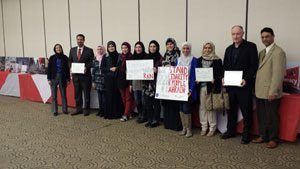DEARBORN — On Tuesday, Feb. 18, Students for Islamic Awareness (SIA) at the University of Michigan-Dearborn (UMD) hosted a forum exposing the struggles of Bahrainis during the small island country’s revolution.
The event, titled “Bahrain: An Uprising in the Shadows,” was co-sponsored by the Arab Student Union of UMD and the Washington D.C.-based nonprofit organization, Americans for Democracy and Human Rights in Bahrain (ADHRB).
The forum included a poetry recital, and three guest panelists addressed the 50-member audience.
As guests arrived, they were met by several photos capturing the resilience and distress of Bahraini protesters.

The images were snapped by a photographer who chose to remain anonymous in order to avoid being harassed by Bahrain’s government.
The room was adorned with white and red to match the Bahraini flag hanging on the front of the podium. Every table featured a lit candle with a photo of a Bahraini martyr next to it.
ADHRB’s Grassroots advocacy associate, Saman Naquvi, urged people to sign letters that were distributed at the event and send them to members of Congress. The letters called for the acknowledgement of the violations of Bahrainis’ human rights.
“This event is something that actually helps the people of Bahrain. We are not going to just sit and listen, and get upset and not do anything about it,” Naquvi said.
Ghadeer Alaradi, an SIA executive board member, said, “It is crucial to hold events like these on campus to raise awareness of the human rights violations that occur while many of us turn a blind eye. I am also glad that we included a proactive component in which we signed letters to send to our local representatives in Congress.”
The first panelist to speak was Brian Dooley, director of the Human Rights Defenders Program at Human Rights First in Washington, D.C. Dooley’s speech centered on the political prisoners in Bahrain and future democratic reforms in the country.
He says many of Bahrain’s political prisoners are made up of doctors, nurses, lawyers, and teachers.
Dooley added that in addition to concentrating on bringing much needed reform to Bahrain, a great deal of concern must be given to what might happen after the changes are implemented.
He added, “Be ready, the day might be a lot closer than we think. And what we need to do is look beyond what happens when there is going to be either a collapse of the regime or a serious root-branch reform. What are we going to do the week after reform comes?”
The second panelist was Dr. Amal Alyusuf, a Bahraini who was one of the doctors put under siege inside a hospital when it was taken over by military forces in March 2011 amid the uprisings.
Salmaniya Medical Complex received the majority of injured protesters. Alyusuf spoke about her experience of being held in the hospital for hours and what she witnessed firsthand.
She was condemned by the government for treating protesters who were sent to the hospital after clashes with the military.
Becoming emotional, she said, “And they (Bahraini military) turned the ward into a prison, literally. They used to come and interrogate patients there, and at night they will come and torture them on their bed, sometimes on their wounds.”
The UMD event marked the first time Alyusuf had spoken about the Bahraini revolution publicly in a while. She hopes speaking about the ordeal can help prevent her children, family and other Bahrainis from going through the same experience.
“Now after three years of the uprising, I realized that even though the wounds healed, they leave a scar, and this scar will stay forever,” she said.
The third panelist, Dr. Qasim Omran, a senior doctor, worked in Bahrain’s Ministry of Health since 1989. He helped treat protestors during the revolution, and he presented images that showed the hardships and atrocities physicians endured while simply tending to patients.
Paramedics started using their own cars after Bahraini security forces vandalized ambulance trucks. He says doctors were expected to keep quiet about the protestors’ degrees of injuries.
If the death of a protestor was caused by military or security action, such as a gunshot wound, the medical staff wasn’t supposed to note the actual cause of death on the death certificate.
“Anybody or any medics, professional, nurse, doctors who is not ready to compromise on his principles of being neutral were kind of cleansed out from the ministry of health,” said Omran.
Riyam Alwishah, an attendee, was impacted by the moving speeches. “The Bahrain event really shed light on the horrid conditions that took place three years ago, and is still continuing. Amal spoke about unimaginable conditions the medical personal was put through just because they were helping save lives. We complain about petty issues daily when across the globe people are fighting to see another day,” she said.
— Fatima Fakhreddine is an intern for The Arab American News.






Leave a Reply